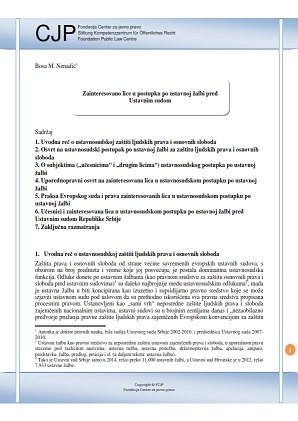Zainteresovano lice u postupku po ustavnoj žalbi pred Ustavnim sudom
The Third Party Concerned in the Constitutional Complaint Proceedings before the Constitutional Court -with Special Reference to the Constitutional Court of the Republic of Serbia
Author(s): Bosa N. Nenadić
Subject(s): Constitutional Law, Human Rights and Humanitarian Law, Public Law, Sociology of Law
Published by: Fondacija Centar za javno pravo
Keywords: Constitution; Constitutional Court; constitutional complaint; Serbia; Serbian legislation; public law; protection of human rights;
Summary/Abstract: In the proceedings before constitutional courts of most European countries, regardless of the subject matter of the constitutional dispute, there are no parties formally (as is the case of court proceedings), instead as a rule, participants appear in the proceedings. When it comes to the constitutional complaint proceedings for the protection of fundamental rights and freedoms, obligatory participants in the proceedings before of the constitutional courts are: the appellant and the enactor of the act or action challenged by the constitutional complaint. However, other persons may participate in the constitutional court proceedings as well, persons most commonly referred in legal literature and constitutional court practice to as „third party concerned “. This paper analyzes the legal position and entitlement of these persons precisely because they have a legal interest in the outcome of constitutional complaint proceedings before constitutional court, since the decision of the constitutional court may affect (directly or indirectly) their rights or freedoms. As there is no provision in the Serbian present legislation for the third party concerned in the constitutional complaint proceedings before the constitutional court (which is rarely found in comparative law), the paper gives a critical review of the presence of a „legal gap“ on the status and entitlements of these persons and points to the necessity and way of its removal in accordance with the requirements of the Constitution and the European Convention (which our legislator has obviously ignored).
Series: CENTAR za JAVNO PRAVO — Projekti
- Page Count: 24
- Publication Year: 2019
- Language: Serbian
- Content File-PDF
- Introduction

